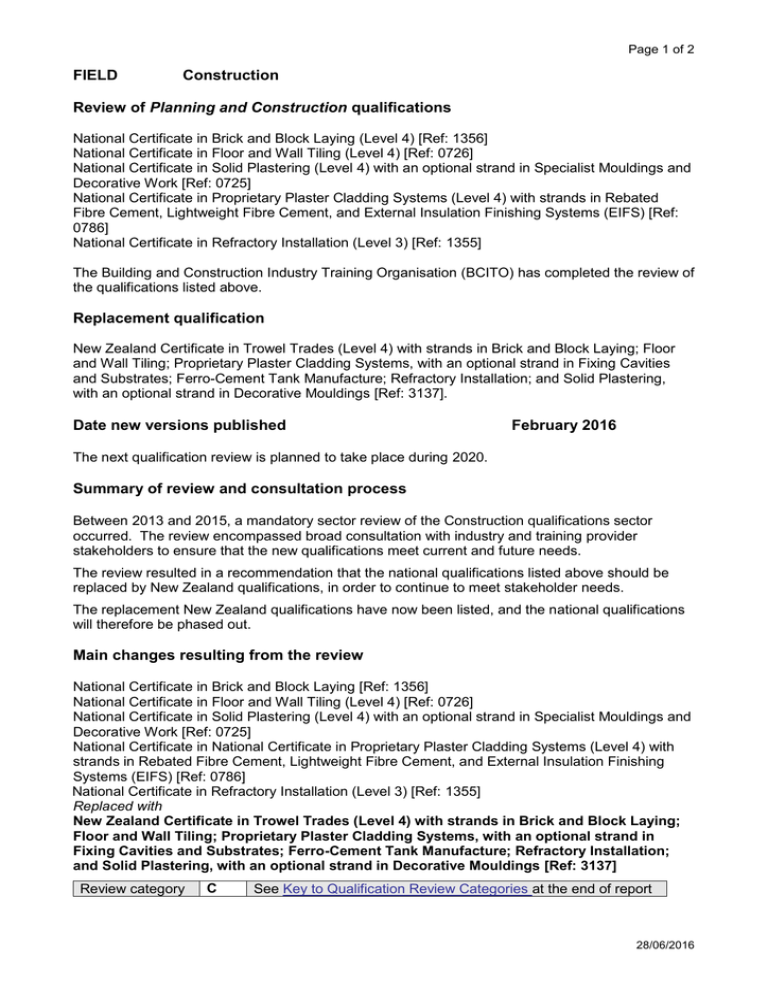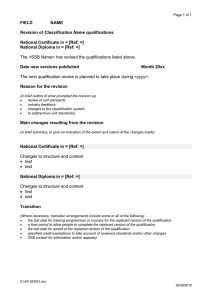revsumfeb16 02
advertisement

Page 1 of 2 FIELD Construction Review of Planning and Construction qualifications National Certificate in Brick and Block Laying (Level 4) [Ref: 1356] National Certificate in Floor and Wall Tiling (Level 4) [Ref: 0726] National Certificate in Solid Plastering (Level 4) with an optional strand in Specialist Mouldings and Decorative Work [Ref: 0725] National Certificate in Proprietary Plaster Cladding Systems (Level 4) with strands in Rebated Fibre Cement, Lightweight Fibre Cement, and External Insulation Finishing Systems (EIFS) [Ref: 0786] National Certificate in Refractory Installation (Level 3) [Ref: 1355] The Building and Construction Industry Training Organisation (BCITO) has completed the review of the qualifications listed above. Replacement qualification New Zealand Certificate in Trowel Trades (Level 4) with strands in Brick and Block Laying; Floor and Wall Tiling; Proprietary Plaster Cladding Systems, with an optional strand in Fixing Cavities and Substrates; Ferro-Cement Tank Manufacture; Refractory Installation; and Solid Plastering, with an optional strand in Decorative Mouldings [Ref: 3137]. Date new versions published February 2016 The next qualification review is planned to take place during 2020. Summary of review and consultation process Between 2013 and 2015, a mandatory sector review of the Construction qualifications sector occurred. The review encompassed broad consultation with industry and training provider stakeholders to ensure that the new qualifications meet current and future needs. The review resulted in a recommendation that the national qualifications listed above should be replaced by New Zealand qualifications, in order to continue to meet stakeholder needs. The replacement New Zealand qualifications have now been listed, and the national qualifications will therefore be phased out. Main changes resulting from the review National Certificate in Brick and Block Laying [Ref: 1356] National Certificate in Floor and Wall Tiling (Level 4) [Ref: 0726] National Certificate in Solid Plastering (Level 4) with an optional strand in Specialist Mouldings and Decorative Work [Ref: 0725] National Certificate in National Certificate in Proprietary Plaster Cladding Systems (Level 4) with strands in Rebated Fibre Cement, Lightweight Fibre Cement, and External Insulation Finishing Systems (EIFS) [Ref: 0786] National Certificate in Refractory Installation (Level 3) [Ref: 1355] Replaced with New Zealand Certificate in Trowel Trades (Level 4) with strands in Brick and Block Laying; Floor and Wall Tiling; Proprietary Plaster Cladding Systems, with an optional strand in Fixing Cavities and Substrates; Ferro-Cement Tank Manufacture; Refractory Installation; and Solid Plastering, with an optional strand in Decorative Mouldings [Ref: 3137] Review category C See Key to Qualification Review Categories at the end of report 28/06/2016 Page 2 of 2 Transition People currently working towards the replaced qualifications may either complete the requirements for that qualification by 31 December 2020 or transfer to a programme of study or training leading to a replacement qualification. The last date for entry into programmes leading to the replaced qualifications is 31 December 2017. It is not intended that anyone be disadvantaged by this review. However, anyone who feels they have been disadvantaged can appeal to BCITO at the contact details below. Building and Construction Industry Training Organisation (BCITO) PO Box 2615 Wellington 6140 Telephone Email Website 64 04 381 6430 nationaloffice@bcito.org.nz www.bcito.org.nz Key to Qualification Review Categories Category A The qualification is published as a new version with the same NZQF ID Category B The qualification is published as a new version with the same NZQF ID Category C A new (replacement) qualification is published with new NZQF ID Category D Qualification will expire. There is no replacement qualification Changes are made to SSB name, contact details or purpose statement No change is made to title, rules or components of the qualification No transition arrangements are required Changes are made to title, rules or components The new version of the qualification recognises a similar skill set to that recognised by the previous version The SSB is confident that people awarded the new or previous version are comparable in terms of competence Transition arrangements are required if candidates must gain additional/different credits for the new version Significant changes are made to the qualification in terms of components, structure, type or level The SSB views people with the replacement qualification as being significantly different in terms of competence from those with the replaced qualification Transition arrangements are required Transition may be limited to phase-out dates Qualification is no longer required by industry The qualification is designated as expiring and a last date for meeting the qualification requirements is set 28/06/2016


